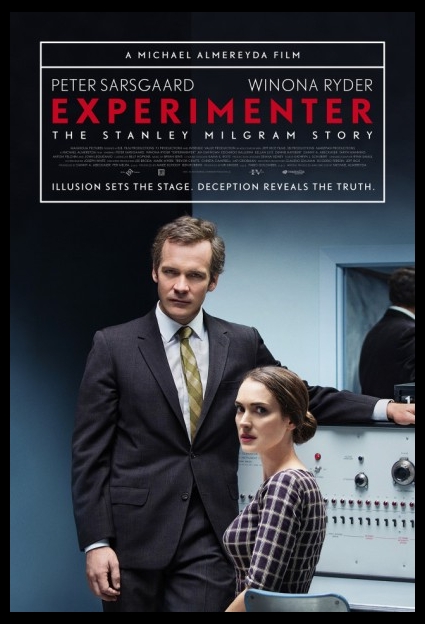Experimenter - An ambiguous biopic
Home > Visitor Columns

Behindwoods.com isn't responsible for the views expressed by the visitor in this column. The visitor claims that this column is his/her own. If the column infringes any copyrights that you hold, please email us at columns@behindwoods.com.
I was just flipping through Netflix and ‘Experimenter’ caught my eye, and just finished watching it.
When we read/hear about atrocities against humanity at a large scale, like the Holocaust, My Lai Massacre, Indonesian Killings, various pogroms in Russian and Eastern Europe, more recently torture (so called enhanced interrogation) of alleged terrorists in Iraq and Afghanistan, one question reverberates through our minds. How can everyday people participate in these acts of evil? Were they just following orders or they are using this institutionalization to satisfy their hidden sadistic desires? Should we just think of them as accomplices or perpetrators? In 1961, when Adolf Eichmann was tried and hanged in Israel, the trial was filmed and broadcasted around the world, one of the remarkable things that shocked everyone was the absence of any remorse or guilt for the crimes he committed, repeatedly said he was just following orders. Could it be that people of his ilk were just morally confused or became confused in their surreal Kafkaesque world and found that following orders was the easy way out? Stanley Milgram, a Yale social psychologist devised a series of experiments to test the ‘obedience’ and administered the experiment over a period of couple of years across a large intersection of people across all sorts of walks of life. What he concluded was so shocking and controversial, some people called it unethical, and many called it revealing, either way the impact of the experiments on the society cannot be ignored, these experiments were fodder of many movies and TV series throughout the years. ‘Experimenter’ is one such attempt.
The center of the film is the Obedience experiment, which measures the willingness of participants to obey an authority figure (in this case, a “doctor” in a white lab coat) who instructs them to ‘teach’ another person, who is a ‘learner’. The teacher gives a series of word matches to the learner and for every wrong answer they are to administer an electric shock of increasing voltage. Though the learner in the other room is perfectly safe, the teacher does not know this; all he/she can hear are the sounds of anguish and the authority figure’s continued insistence to continue with the experiment in a calm and collected voice. Most of the people if told of this would think that they will not administer the shocks, but results show us that 65% of people go all the way to 450 volts (although it’s not real, they don’t know that) all in the name of following instructions, not one person gets up and checks on the other person who is obviously in pain.
The movie follows Stanley Milgram as he conducts his experiments and in brief interludes we get to see him court, marry his wife and have children. The film’s focus is on his academic career, so we follow him from his early days at Yale, to Harvard and finally to City University of New York, where he spent the rest of his career. Milgram conducted many of the social experiments such as ‘Lost Letter experiment’, ‘Small world Phenomenon’, etc. that are famous even now, and his conclusions such as ‘six degrees of separation’ is a widely popular theory. The film touches upon his fascination with human condition, group psychology and choice and its influence. The film can’t exactly be called a biopic, rather a swath of his academic life and its impact, there isn’t enough drama in his personal life may be. The film is told in many anecdotes in a chronological order with frequent monologues by Milgram (played by Peter Sarsgaard) breaking the fourth wall. It is done in an interesting fashion in the film, when Milgram starts talking to the audience, the rest of the cast and background fades although they are still there, one of the theatrical devices used in the movie is the presence of an actual elephant in the room when Milgram delivers his monologues to us, the elephant representing his background as a jew whose family members suffered the holocaust.
Peter Sarsgaard’s Milgram comes across as an emotion-less robot, occasionally gives into his primal emotion of anger when confronted. In fact, the film doesn’t really judge Milgram one way or the other; rather the inference is left to us based on several supporting and opposing voices that are cast in the film. The irony is that Milgram doesn’t see his own decisive need to imply on authority on others, so in effect he is proving his own experiment. Most of the discussions on his experiments even posthumously are about ethical nature of the experiments, what is right? What is wrong? As Milgram says in the movie, “Life can only be understood backwards, but must be lived forwards”.
Written and directed by Michael Almereyda, the structure of the film might remind you of a theatrical production, where one cast member is addressing the audience when rest of the cast act as if they are invisible, and occasionally break out into a song, and slow changing landscape, and obviously fake driving sequences. These implements work in a stage production, and I think the script would be excellent on a stage, and I look forward to it. The film also reminded me of one of the creepy ‘Compliance’ film, which is actually based on real life incidents, where someone called several fast food restaurants identifying as a police officer and asked supervisors to conduct escalating acts of abuse and invasive searches on female employees, who shockingly complied. You should check it out if you doubt if the obedience experiments are valid or not. This might also remind you of the ‘Stanford prison experiment’, which is another controversial topic.
Whatever the narrative structure is, this film is yet another retelling of the story of the obedience experiments and of Stanley Milgram and presents a nuanced view of his life and times. Whatever our moral values are when put to test, can they stand the pressure of authority, compliance? As per Stanley Milgram and other social psychologists, when we are making these difficult choices, we display what’s called an agentic personality, i.e. behavior of an agent assuming no responsibility for actions or consequences, only following the orders of someone in authority. This is beautifully illustrated in the penultimate scene of the movie, when Milgram (who is having his fifth heart attack) is rushed to the hospital by his wife, the person at the front desk, displays concern, but after hearing about the onslaught of fifth heart attack, pulls out a form on a clipboard and says, ‘you need to fill this out’.
Experimenter – Can you resist?
bhaskar.gandavabi@gmail.com
Please send your column to columns@behindwoods.com.



